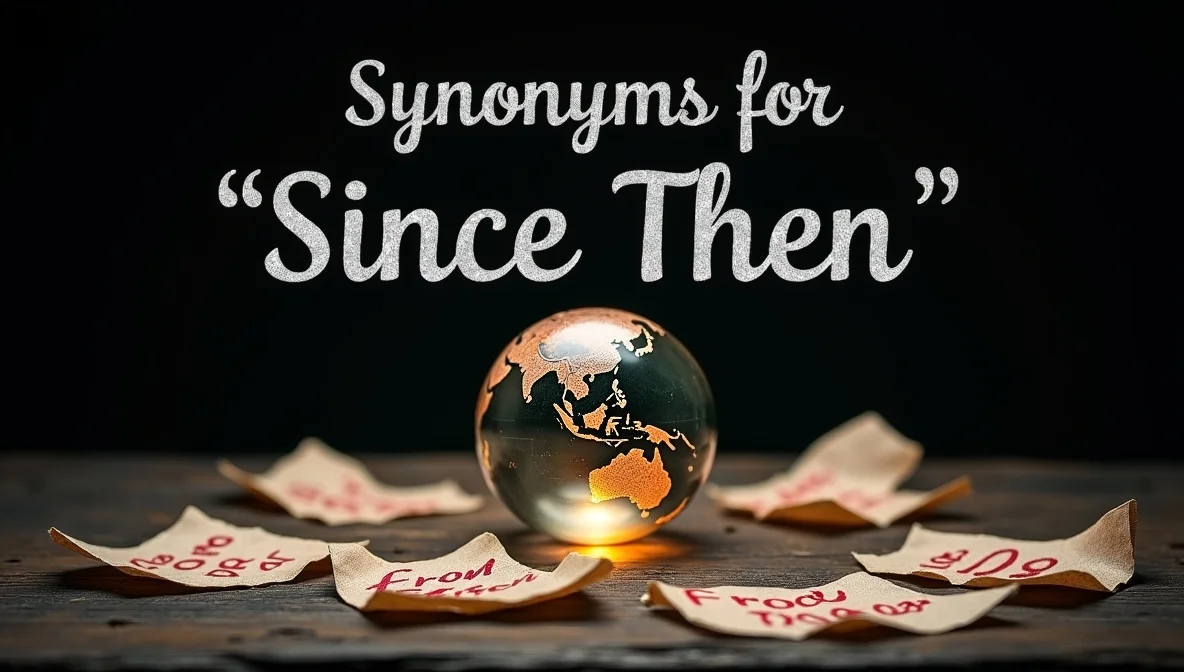When writing or speaking, it’s often important to vary our language to make the message more interesting and dynamic. The phrase “since then” is commonly used to refer to a point in time after a previous event. However, there are numerous synonyms and alternatives that can provide variety to your writing while maintaining clarity. In this article, we will explore several alternatives for “since then” that can be used in different contexts, whether you are writing an essay, a report, or simply having a conversation. These variations can help ensure your communication remains engaging and precise. Let’s dive into some of the most useful synonyms for “since then” and how they can be applied effectively. Synonyms for “Since Then”.
After that
The phrase “after that” serves as a simple and effective alternative to “since then.” It indicates a point in time following an event or action. For example, you could say, “The team won the championship, and after that, they celebrated their victory with a parade.” This synonym works well when referring to something happening directly after a specific event, maintaining a smooth flow in the narrative. It can also be used in both formal and informal settings, making it a versatile choice for different types of communication. Using “after that” allows you to maintain a logical progression in your writing or speech without over-relying on the phrase “since then.”
Read More: Professional Ways to Say “Throwing Up”
From that point forward
Another synonym that can replace “since then” is “from that point forward.” This expression is typically used to signify a moment in time after which things continued or changed. For example, “The decision was made, and from that point forward, all projects were completed on time.” This alternative can be especially useful in situations where you are referring to a long-term change or shift that occurred following an event. It emphasizes the continuity or ongoing nature of the period after the reference event. “From that point forward” carries a sense of purpose or direction, indicating that something significant happened that influenced the course of events moving ahead.
Thereafter
“Thereafter” is another excellent alternative for “since then.” It is often used in formal contexts and implies a period that starts after a particular event or moment. For example, “The new law was enacted, and thereafter, businesses were required to comply with the new regulations.” This synonym is most effective in written forms of communication, such as legal documents, academic papers, or formal reports. It has a slightly more elevated tone than other options, which makes it particularly suitable for professional or scholarly language. When using “thereafter,” you can convey a sense of time passing in a structured and clear manner, adding sophistication to your writing.
As a result
Although “as a result” doesn’t explicitly convey time, it is an excellent way to refer to the outcome or effect that occurs following an event. For example, “He failed the test, and as a result, he had to retake the course.” This expression highlights the cause-and-effect relationship between two events, and while it does not directly replace “since then,” it can serve a similar function when explaining the consequences of something that occurred earlier. Using “as a result” can also be beneficial in persuasive or analytical writing, where the focus is on explaining the results or implications of past actions.
From then on
“From then on” is another strong alternative to “since then” that conveys the idea of continuity or change starting after a particular event. For instance, “The company introduced new policies, and from then on, all employees were expected to adhere to stricter guidelines.” This phrase is useful when you want to emphasize that a change or event initiated a shift in the way things proceeded. It highlights the ongoing nature of what followed, making it a suitable choice for both informal and formal contexts. “From then on” can effectively denote that a new phase or pattern began after a specified event.
Afterward
The word “afterward” is an alternative that works particularly well in more conversational or less formal contexts. It can be used similarly to “after that,” signaling something happening after a certain event or moment. For example, “We had dinner, and afterward, we went to the movies.” It is less rigid than “thereafter” and can be used flexibly in everyday conversation or writing. In addition, it is also commonly used in storytelling and narratives to maintain a smooth, chronological flow of events. When aiming for a relaxed tone, “afterward” can serve as a simple and effective substitute for “since then.”
Subsequently
“Subsequently” is another useful synonym for “since then,” often employed in formal or academic writing. It refers to something that happens after a particular event or time. For example, “The contract was signed, and subsequently, the project was launched.” This word conveys a sense of order and logical progression. It is ideal when you need to describe events that follow in sequence, often used in scientific writing, reports, and detailed narratives. “Subsequently” ensures clarity and helps the reader understand the timeline of events in a structured manner.
In the aftermath
“In the aftermath” is typically used to describe the period following a significant or impactful event, especially one that has major consequences. For example, “In the aftermath of the storm, the community rallied together to rebuild the town.” This synonym emphasizes the aftermath or consequence of something substantial that has occurred. It is often used in discussions about disasters, crises, or important events, and conveys the idea that significant changes or responses followed shortly after the occurrence. “In the aftermath” works particularly well when the event you’re referring to has had lasting or profound effects.
Following that
“Following that” is a more straightforward and neutral synonym for “since then,” commonly used in both written and spoken communication. It refers to the events or actions that take place after a given moment. For example, “The team lost the game, and following that, they focused on improving their training sessions.” This alternative is flexible and works well in almost any context, making it a valuable tool for writers or speakers looking to avoid repetition. It is particularly effective in providing a smooth transition between events while maintaining clarity.
After a while
While slightly different in meaning, “after a while” can sometimes replace “since then,” particularly when referring to a passage of time. It indicates a period of time passing before something happens. For example, “They moved to the city, and after a while, they became accustomed to the fast-paced lifestyle.” This synonym is useful when you’re describing a gradual change or adjustment that occurs after an event. It gives a sense of time passing but does not specify an exact moment, making it more informal and flexible in use.
In the course of time
“In the course of time” is another phrase that can be used to express the passage of time after a particular event or moment. For example, “In the course of time, the company expanded and became an industry leader.” This phrase is often used in more reflective or descriptive contexts, highlighting the gradual progression of events over time. It works well in storytelling or when you want to emphasize that things changed or evolved over a period. “In the course of time” conveys a sense of historical development and is suitable for both formal and informal use.
From that moment
“From that moment” is an excellent synonym for “since then” when you want to emphasize the exact point at which a change or event occurred. For example, “She decided to pursue her dreams, and from that moment, her life took a new direction.” This phrase highlights the significance of a specific moment in time that leads to a new course of action or outcome. It adds a sense of immediacy and impact to the event being discussed, making it particularly useful in narratives or personal stories.
Ever since
“Ever since” can be used to indicate a continuous period of time from a particular event or moment. For example, “They got married, and ever since, they’ve been traveling the world together.” This synonym emphasizes continuity and the lasting effects of an event. It can be especially useful in informal settings, where the focus is on describing an ongoing situation or relationship that has persisted from the time of the event. “Ever since” is a casual yet effective way to replace “since then” when discussing events that have ongoing implications.
In the period that followed
The phrase “in the period that followed” is another option that can replace “since then” in more formal writing. It implies that a specific period of time followed an event or occurrence. For example, “The decision was made, and in the period that followed, significant changes were implemented.” This phrase works well in more analytical or report-based writing, where you may want to be precise about the time that passed following a key event. It provides clarity and structure, making it an excellent choice for professional communication.
After the fact
“After the fact” is a synonym that can be used to describe something that happens after an event, typically implying that it was done too late or as a reaction. For example, “He apologized after the fact, but the damage had already been done.” This phrase is often used to discuss actions or decisions that are made after an event has occurred, sometimes with a sense of regret or missed opportunity. It can be particularly useful in informal contexts, where you’re reflecting on a situation and its aftermath.
Conclusion
In conclusion, there are many synonyms for “since then” that can be used to add variety and depth to your writing or conversation. Whether you’re aiming for formality or informality, options like “after that,” “subsequently,” “from that moment,” and “in the aftermath” offer flexibility and precision. Each alternative can be used in different contexts depending on the tone, purpose, and emphasis you wish to convey. By incorporating these synonyms into your writing, you can keep your language engaging, dynamic, and clear.

James Carter is a language expert at WordSeekerz.com, dedicated to making English grammar and vocabulary simple and engaging. Explore more at WordSeekerz.com and enhance your language journey today!










